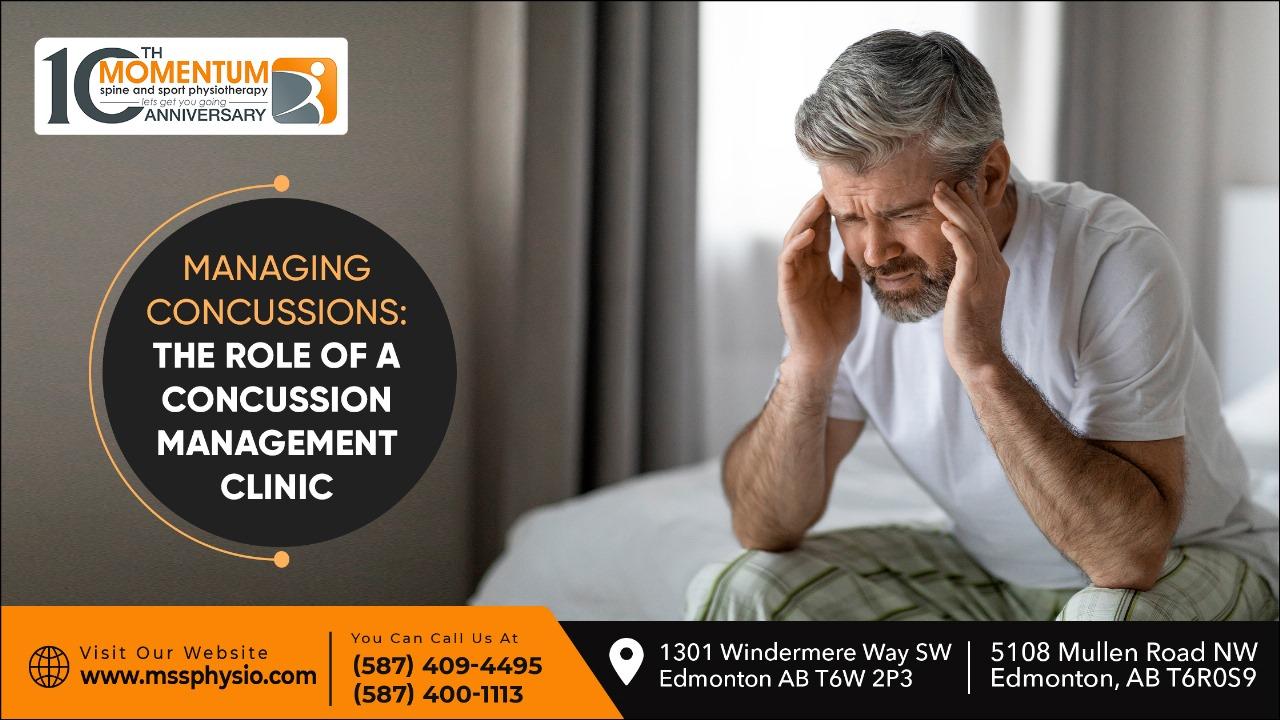
Concussions, often dismissed as just a bump on the head, can have far-reaching effects if not properly managed. In Edmonton, the importance of specialized care for concussion treatment is increasingly recognized, leading to the rise of dedicated concussion management clinics like Momentum Physiotherapy. These clinics are pivotal in providing comprehensive care for concussion patients, from initial assessment to full recovery. In this post, we will delve into the critical role of concussion management clinics and how they are changing the landscape of concussion physiotherapy in Edmonton.
Understanding Concussions and Their Impact
A concussion occurs because of an impact on the head or a forceful movement causing rapid back-and-forth motion of the head and brain. This abrupt motion can lead to chemical alterations in the brain and potentially cause stretching or damage to brain cells. The symptoms of a concussion might not be immediately noticeable and can be quite subtle, with their duration varying from days to weeks or even longer.
Initial Assessment
The first step in concussion management is a thorough assessment. This involves detailed patient interviews to understand the mechanism of injury and symptoms experienced. Neurological assessments, which include tests for cognitive abilities and balance, are employed to evaluate brain function post-injury. In certain cases, detailed imaging studies such as MRI or CT scans may be necessary for comprehensive analysis. This initial evaluation plays a vital role in gauging the severity of the concussion and informing the development of an appropriate treatment strategy.
Rest and Recovery Phase
Immediately following a concussion, a period of rest is often recommended to allow the brain to heal. This rest phase involves limiting physical and cognitive activities that could exacerbate symptoms. Patients are typically instructed to limit physically demanding activities, decrease screen time, and partake in light activities that don’t overexert the brain. The length of this rest period is based on the individual, depending on their specific symptoms and the pace of their recovery.
Gradual Return to Activity
Following the rest period, patients are gradually reintroduced to daily activities. This step-by-step approach is carefully monitored to ensure activities do not trigger or worsen symptoms. The progression typically moves from light physical activity, like walking, to more demanding tasks, eventually returning to sports or work-related activities. Each step is tailored to the individual's tolerance and response.
Physical Therapy for Symptom Management
Concussion physiotherapy is vital in managing physical symptoms such as headaches, dizziness, and balance problems. Physical therapists employ various techniques, including vestibular rehabilitation for balance issues and manual therapy for neck pain. Exercises are also prescribed to improve strength, coordination, and flexibility, which may have been affected by the injury.
Physiological and Manual Therapy Techniques
- Craniosacral Therapy: A gentle, hands-on technique that alleviates the tensions in the membranes and fluids surrounding the brain and spinal cord.
- Soft Tissue Mobilization: Used to relieve tension in the muscles of the head, neck, and upper back, which can contribute to headaches and neck pain post-concussion.
- Joint Mobilization: Techniques targeting the neck and upper spine, helping to relieve pain, improve range of motion, and alleviate stress on neurological structures.
Exercise-Based Rehabilitation
- Targeted Strengthening Exercises: Focused on neck and core muscles to support the head and reduce the strain on the neurological system.
- Cardiovascular Conditioning: Gradual reintroduction of aerobic exercises, under supervision, to enhance blood flow to the brain and improve overall endurance.
- Sensorimotor Training: Exercises designed to improve coordination and sensory integration, crucial for athletes who need to regain their sport-specific skills.
Cognitive Rehabilitation
Cognitive rehabilitation is crucial for cognitive symptoms like memory loss, difficulty concentrating, or processing information. This therapy involves Cognitive Behavioral Therapy, exercises, and activities designed to improve cognitive functions gradually. Speech-language therapists often assist in this process, helping patients regain their pre-injury cognitive abilities.
Psychological Support
Concussions can have emotional and psychological impacts, such as anxiety, depression, or changes in mood. Addressing these aspects is vital for a holistic recovery. Counseling or therapy sessions with psychologists or mental health professionals are often part of the concussion management plan, providing necessary support and coping strategies.
Mindfulness and relaxation techniques aid in managing stress and facilitate neurological relaxation, which is crucial for brain healing. Memory and concentration exercises involve specific cognitive exercises to improve focus, memory, and other executive functions.
Education and Prevention Strategies
Concussion management clinics place a strong emphasis on educating patients about their condition. This education includes information on recognizing symptoms, strategies for symptom management, and guidance on preventing future concussions. Educating athletes, parents, coaches, and others about the risks and signs of concussions is also a critical aspect of comprehensive concussion management.
Long-term Monitoring and Follow-Up
Concussion recovery can be unpredictable, and long-term monitoring is often necessary. Regular follow-up appointments to monitor the individual's progress and adjust treatment plans as needed are scheduled. This continuous evaluation helps identify any lingering or late-appearing symptoms, ensuring complete and thorough recovery.
A Comprehensive Approach to Concussion Recovery
Concussion management clinics, like Momentum Physiotherapy Edmonton, are crucial in helping patients recover from this complex injury. By providing specialized, patient-centered care, these clinics are instrumental in guiding patients through their recovery journey. From accurate diagnosis to tailored treatment plans and comprehensive patient education, the role of concussion management clinics is indispensable in ensuring safe and effective recovery from concussions.
Also read about:
Revitalizing Womens Health A Deep Dive into Pelvic Floor Physiotherapy
The Best Furniture Sales In Dubai
Is it cheaper to have simple custom made furniture in UAE



